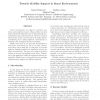Free Online Productivity Tools
i2Speak
i2Symbol
i2OCR
iTex2Img
iWeb2Print
iWeb2Shot
i2Type
iPdf2Split
iPdf2Merge
i2Bopomofo
i2Arabic
i2Style
i2Image
i2PDF
iLatex2Rtf
Sci2ools
108
click to vote
SEKE
2009
Springer
2009
Springer
Towards Mobility Support in Smart Environments
Smart environments are subject to intensive academic and industrial research. Many of these research projects deal with challenges such as heterogeneity, personalization and context-awareness. However, most of them assume smart environments to be insular places. Considering users visiting different environments in daily life, this assumption becomes unrealistic. Mobile users wish to use personal functionality in their home environment as well as in other environments they visit in daily life. In this paper we describe different realization patterns to implement services for smart environments. The aim is to support personalization of services and mobility of the users. Depending on the application, different realization patterns are preferable. Furthermore, we describe how our prototype implementation supports the different patterns.
Daily Life | Different Realization Patterns | SEKE 2009 | Smart Environments | Software Engineering |
Related Content
| Added | 27 May 2010 |
| Updated | 27 May 2010 |
| Type | Conference |
| Year | 2009 |
| Where | SEKE |
| Authors | Daniel Retkowitz, Ibrahim Armac, Manfred Nagl |
Comments (0)

